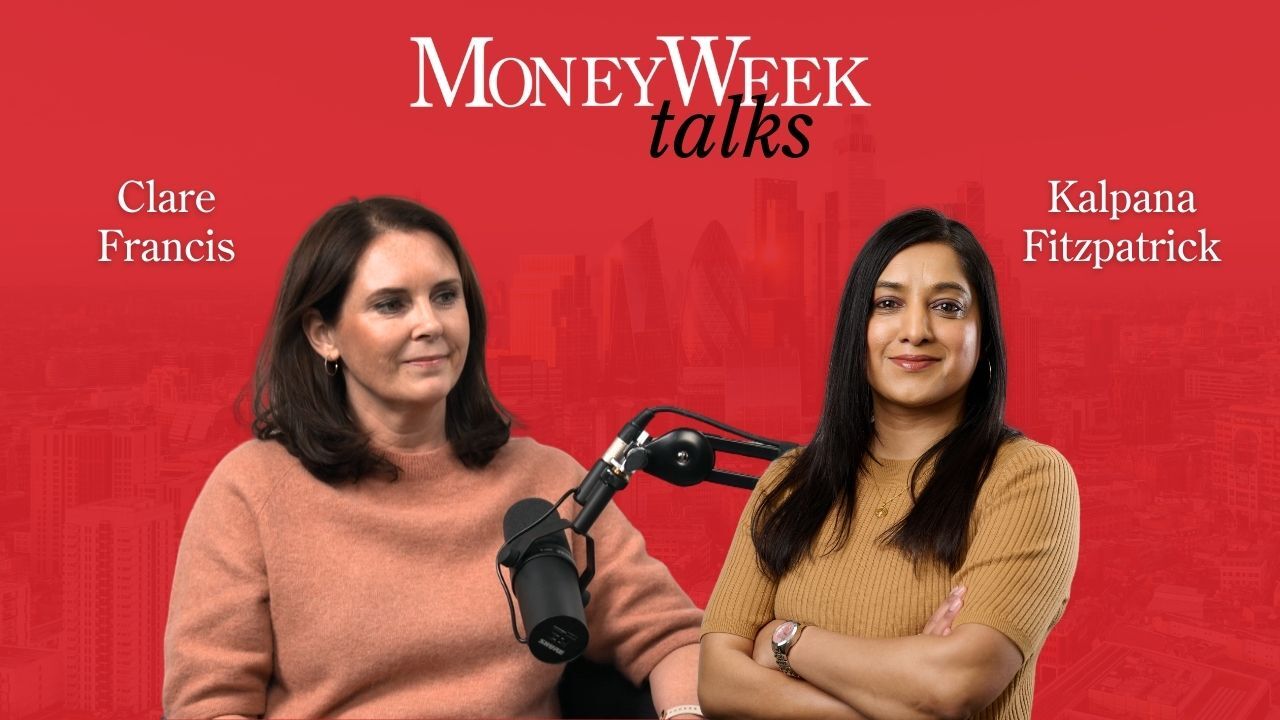What’s happening with UK house prices? Latest property market moves and forecasts
Could house prices be on the up in 2026 following a stagnant 2025?

Sam Walker

Get the latest financial news, insights and expert analysis from our award-winning MoneyWeek team, to help you understand what really matters when it comes to your finances.
You are now subscribed
Your newsletter sign-up was successful
Want to add more newsletters?
House prices look to be on the up at the start of 2026 following a subdued 2025 – but where will they go next?
The main house price indices (HPI) suggest the market has started the year positively as mortgage rates fall and confidence returns.
UK property prices languished in 2025 as the temporary increase to stamp duty thresholds ended and buyers and sellers awaited any announcements from the government in the Autumn Budget before making any moves.
Try 6 free issues of MoneyWeek today
Get unparalleled financial insight, analysis and expert opinion you can profit from.

Sign up to Money Morning
Don't miss the latest investment and personal finances news, market analysis, plus money-saving tips with our free twice-daily newsletter
Don't miss the latest investment and personal finances news, market analysis, plus money-saving tips with our free twice-daily newsletter
Elevated mortgage costs, despite falling from their highest level in 15 years in 2023, are also adding to costs for homeowners.
As of 24 February, the average two-year fixed residential mortgage is 4.83% according to Moneyfacts, up from 2.52% in early 2021. Meanwhile the average five-year fixed residential mortgage rate is 4.95%, up from 2.71% at the start of 2021.
Slowing inflation, low growth and high unemployment could prompt the Bank of England into lowering interest rates over the coming months too. This could feed into mortgage rates and drive up house prices.
What is the current average house price in the UK?
There are five main house price indices measuring how much UK house prices have gone up or down over the past month and year: HM Land Registry/Office for National Statistics (ONS), Halifax, Nationwide, Zoopla and Rightmove.
HM Land Registry UK House Price Index
The most authoritative is HM Land Registry as its data includes cash purchases as well as homes financed through a mortgage. Its data is published on a six-week time lag though, meaning it’s more retrospective than other house price indices.
According to the latest available Land Registry data, released in February 2026, the average UK house price is £270,259 (December 2025), falling 0.7% from £272,043 in November.
Nationwide House Price Index
The most recent Nationwide data shows house prices returned to growth in January after a December slump.
This puts the average UK house price at £270,873, according to the building society.
Halifax House Price Index
House prices jumped by 0.7% to £300,077 in January, the most recent data from Halifax reports. It is the first time the average price of a home, based on the lender’s index, has breached the £300,000 threshold.
Rightmove House Price Index
Unlike Nationwide and Halifax’s HPIs, which are based on the building society and bank’s valuations at the mortgage-approval stage, Rightmove’s HPI is based on asking prices.
According to the latest data from Rightmove, the average UK property asking price is £368,019 (February 2026), down £12 from January.
This would suggest house prices are flatlining, however Rightmove said asking prices recorded their greatest January rise in 25 years at the start of 2026, increasing 2.8% from £358,138 to £368,031 as buyers flooded the market post-Christmas.
Zoopla House Price Index
The Zoopla house price index uses sold prices, mortgage valuations, and data for agreed sales to calculate house prices for any given month.
The property portal’s latest index said the average UK house price is £269,900, as of January 2026, up marginally from £269,800 in December.
It also said there were 6% more homes on sale in January compared to the same month in 2025, which will keep house price growth in check.
Which UK regions have seen the highest and lowest growth?
By and large, Northern Ireland is the region where house prices grew the most in 2025.
Property prices went up by 9.7% across the country in 2025, according to Nationwide, considerably outpacing all other regions of the UK.
Across all UK regions, between October 2024 and October 2025, house prices rose the most in Northern Ireland, said Lloyds Bank. It said prices rose by 5.8% (£9,302) over the 12-month period it tracked.
And it’s not just been in the last year or so that real estate has boomed in Northern Ireland.
The average house price across the country has surged by 45% since the start of 2020 compared to 27% across the UK, according to research by insurance firm Smart Mortgage Insurance.
It means a typical home in Northern Ireland is now worth £60,000 more than pre-pandemic.
Other UK regions which experienced significant house price growth in 2025 are Scotland and the north of England. House prices and mortgage costs are generally lower in these areas, which can stimulate house price increases.
Conversely, house prices have largely stagnated in southern England and London where affordability is more of a concern for buyers.
Most of the major indices indicate property prices have risen just slightly, remained flat or even fallen in the capital. Reasons why house prices are struggling in London are myriad, but in part due to higher stamp duty costs since April 2025 and a languishing premium market.
Is confidence in the market turning a corner?
As well as the five main HPIs released on a regular basis, the Royal Institution of Chartered Surveyors (RICS) also publishes a monthly Residential Market Survey.
The report generates net balance scores between -100 and +100 in response to a series of questions put to its members (estate agents and surveyors) about how the housing market has changed.
The latest RICS report suggests the housing market is showing signs of “tentative recovery” with sentiment around sales and house prices becoming less negative.
RICS members reported that new buyer enquiries rose from -21% in December to -15% in January, up from -29% in November.
Agreed sales followed a similar upward trend – the latest net balance of -9% is the least negative reading since June 2025.
The net balance for price growth over the past three months stood at -10%, improving steadily from a low of -19% in October 2025.
Will house prices rise in 2026 and beyond?
Largely speaking, lenders and major estate agents believe house prices will rise in 2026.
Estate agency Hamptons expects that house prices will grow modestly in 2026, anticipating an increase of 2.5% by Q4 2026.
This growth is forecast to be driven mostly by a healthier market in the West Midlands, North West and Wales.
Better affordability in these two regions is a major factor for growth where fewer buyers are priced out of the market.
Wider economic factors play a part too – the estate agency said anticipated interest rate cuts by the Bank of England in 2026 and easing inflation will combine to stimulate growth in house prices.
Halifax is forecasting property prices to edge up between 1% and 3% in 2026.
However, estate agent Savills predicts prices will increase by just 2% in 2026.
That said, in the four years between 2027 and 2030, it expects prices to grow 4%, 5%, 5.5% and 4%, respectively, in part due to wages rising by a forecasted 22% between 2025 and 2029 and improved economic growth.
How have mortgage interest rate changes impacted buyer affordability in the UK?
Savills predicts the number of people buying homes between 2025 and 2030 will be boosted by falling mortgage rates while more relaxed affordability tests from lenders could boost transaction volumes.
Zoopla believes house price growth will be slow in 2026 at 1.5%, with interest rate cuts slowly filtering through to make owning a home cheaper.
Meanwhile, Nationwide’s recent House Price Review suggests property prices will rise between 2% and 4% in 2026 due to falling mortgage rates and as wage growth outpaces property price growth.
The “mansion tax” on homes valued at more than £2 million, introduced in the 2025 Autumn Budget and coming into effect in 2028, is “unlikely to have a significant impact on the market”, the building society added, as it will only apply to 1% of homes.
Get the latest financial news, insights and expert analysis from our award-winning MoneyWeek team, to help you understand what really matters when it comes to your finances.

Daniel is a financial journalist at MoneyWeek, writing about personal finance, economics, property, politics, and investing.
He covers savings, political news and enjoys translating economic data into simple English, and explaining what it means for your wallet.
Daniel joined MoneyWeek in January 2025. He previously worked at The Economist in their Audience team and read history at Emmanuel College, Cambridge, specialising in the history of political thought.
In his free time, he likes reading, walking around Hampstead Heath, and cooking overambitious meals.
- Sam WalkerWriter
-
 Are money problems driving the mental health crisis? MoneyWeek Talks
Are money problems driving the mental health crisis? MoneyWeek TalksPodcast Clare Francis, savings and investments director at Barclays, speaks about money and mental health, why you should start investing, and how to build long-term financial resilience.
-
 Pensioners ‘running down larger pots’ to avoid inheritance tax as rule change looms
Pensioners ‘running down larger pots’ to avoid inheritance tax as rule change loomsChanges to inheritance tax (IHT) rules for unused pension pots from April 2027 could trigger an ‘exodus of large defined contribution pension pots’, as retirees spend their savings rather than leave their loved ones with an IHT bill.